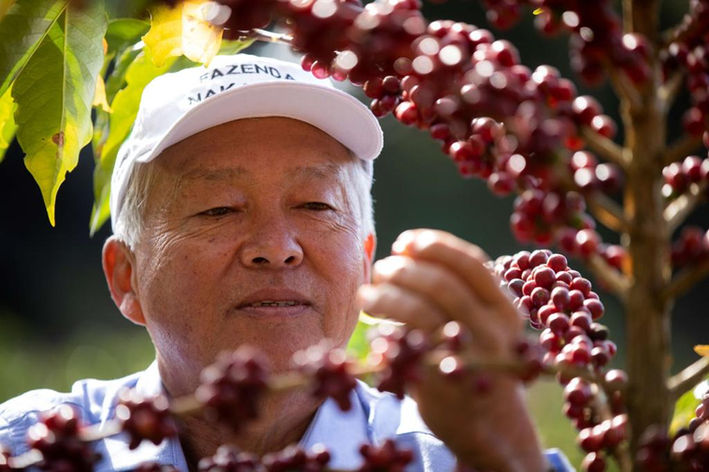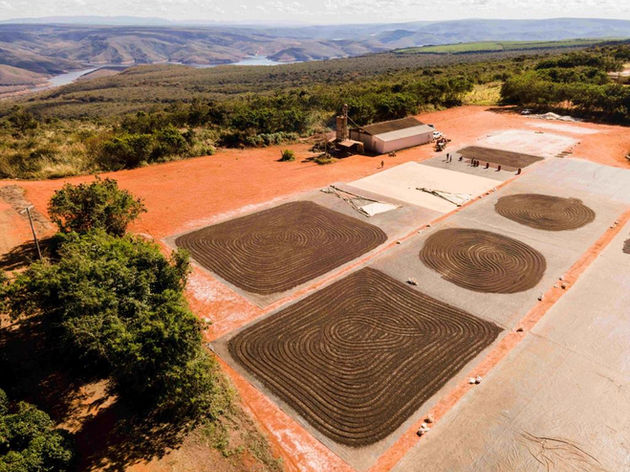
Nakamura
José Gonçalves de Minas - MG
O café é nosso companheiro de vida
O Produtor
Cláudio é Engenheiro Agrônomo, formado pela Universidade Federal do Paraná (UFPR), e, junto com sua esposa Elvia, mudou-se para a Chapada de Minas em 1986. Atualmente, com a colaboração do filho Éder — Engenheiro Ambiental formado pela Universidade Federal de Viçosa (UFV) e que retornou ao Brasil após passar alguns anos no Japão —, eles se dedicam à produção de cafés de alta qualidade.
Ganhando destaque especialmente pelos seus cafés fermentados, que passam 10 dias em barris selados, eles frequentemente figuram entre as primeiras colocações em concursos de qualidade de café. Segundo Cláudio, o café é um companheiro de vida que trouxe prosperidade e oportunidades de trabalho para a família.
Sobre a Fazenda Nakamura
A história da família Nakamura começou em 1929, quando vieram do Japão para o Brasil em busca de melhores condições de vida e trabalho. Inicialmente, estabeleceram-se no município de Bastos, na região alta do estado de São Paulo, dedicando-se à agricultura, cultivando diversos tipos de cereais e algodão. Na década de 1940, mudaram-se para Londrina, no estado do Paraná, onde iniciaram o cultivo de café. Após uma forte geada em 1975, parte da família mudou-se para a região da Mogiana Paulista em busca de novas oportunidades no cultivo do café. Em 1986, aproveitando a oportunidade de adquirir uma propriedade na Chapada de Minas, Cláudio e sua esposa Elvia mudaram-se para lá com o objetivo de viver da cafeicultura, e foi aí que se iniciou a história da Fazenda Nakamura.
Eles passaram vários anos preparando a terra, observando todas as normas ambientais antes de começarem a plantar mudas de café. A fazenda possui uma área total de 250 hectares, com 60 hectares dedicados ao cultivo de café, 50 hectares de floresta regenerativa e 100 hectares de áreas de preservação. A região é uma área de transição entre Mata Atlântica e Cerrado, e para os próximos anos, eles planejam implementar áreas irrigadas, uma vez que a seca é um desafio constante. O clima, especialmente o tempo seco e a falta de chuvas, representaram grandes obstáculos.
Além disso, houve uma queda no preço do café logo nas primeiras colheitas, mas eles conseguiram superar todas essas dificuldades. Sempre houve grande colaboração, parceria e entendimento da comunidade local e dos vizinhos da região, que viram na cafeicultura uma oportunidade de transformação de vida. Eles priorizam a mão de obra local, e a colheita é realizada 100% de forma manual, sem o uso de máquinas, focando não apenas na produção do melhor produto, mas também no desenvolvimento socioeconômico da região. Em anos de safra cheia, mais de 100 colaboradores passam pela propriedade, e, se depender de Cláudio, a colheita manual continuará assim por muitos anos. Todas as práticas de manejo são mecanizadas, o que reforça ainda mais o compromisso da Família Nakamura com o desenvolvimento socioeconômico da região.
Um dos diferenciais da região é a maturação uniforme dos grãos, já que ocorre apenas uma florada; a colheita começa em meados de junho e se estende até entre agosto e setembro. Outro fator importante para a qualidade dos cafés são as técnicas de fermentação utilizadas por eles, que melhoram a cada ano: após passarem pelo lavador, os cafés são deixados em barris selados por 10 dias, intensificando aromas e sabores. Com foco no desenvolvimento sustentável, hoje utilizam energia fotovoltaica para atender toda a demanda energética da fazenda.








